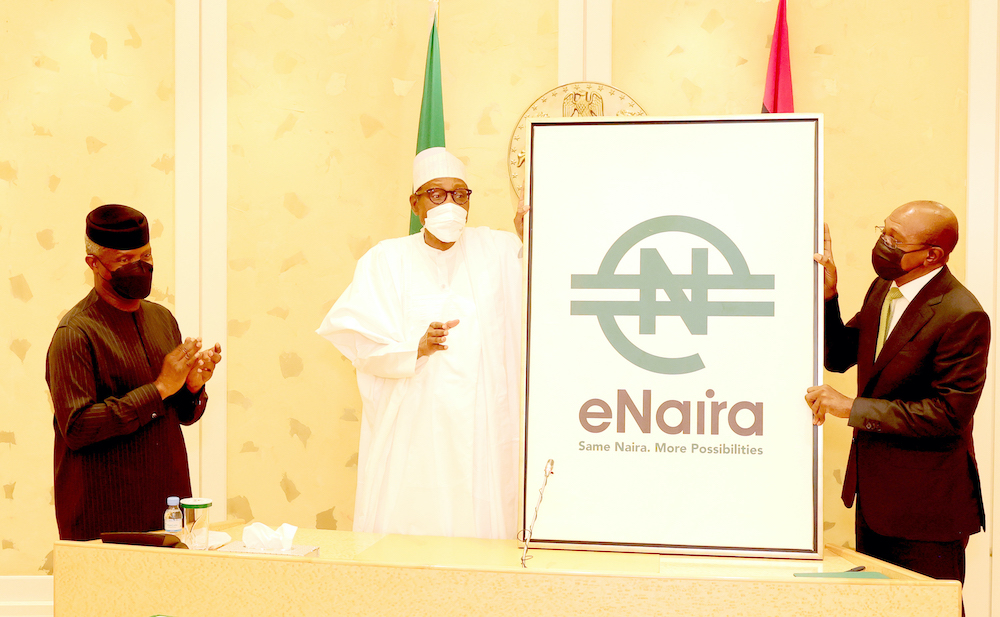As FG launches eNaira
The launch of the eNaira on October 25, 2021, marked a milestone in Nigeria’s financial history and the country’s integration into the global economy. All aspects of our lives are becoming digitized, and payment systems, which power commerce and all forms of exchanges, are not left out. Digital assets are going mainstream in many countries, […]

PRESIDENT BUHARI LAUNCHES eNAIRA. 0A&B. President Muhammadu Buhari with the Vice President Prof Yemi Osinbajo SAN and The CBN Governor Mr. Godwin Emefiele as President unveile the eNaira at the State House Abuja. PHOTO; SUNDAY AGHAEZE. OCT 25TH 2021
The launch of the eNaira on October 25, 2021, marked a milestone in Nigeria’s financial history and the country’s integration into the global economy.
All aspects of our lives are becoming digitized, and payment systems, which power commerce and all forms of exchanges, are not left out. Digital assets are going mainstream in many countries, even as regulators are making efforts to either kill or mitigate the several risks they portend to financial stability.
In Nigeria, the Central Bank is trending along. After initially declaring decentralised digital assets, mainly crypto currencies such as Bitcoin, Coinbase, Etherium, etc. as illegal, the apex bank, in a deft move that characterised Nigeria as the first African country to launch a central bank digital currency, joined sovereigns such as the Bahamas and Eastern Caribbean. China also launched its pilot version of the digital renminbi, the official currency of the country.
While the eNaira platform experienced some form of initial challenges, including issues involving the Speed Wallet, the CBN was able to take care of the hiccups without delay.
Quite remarkably, in a few days, the eNaira recorded more than 2.5 million average daily visits, with 33 banks integrated on the platform, offering eNaira wallets and about half a billion naira successfully minted and held by more than 200,000 customers who are fully on board.
The statistics show a strong appetite of Nigerians in going digital and perhaps the CBN may have foreseen this as a measure to reduce the volume of cash in circulation, increase oversight on naira flows, which is essential to strengthening monetary policy transmission and reducing the cost of printing the physical naira, which many Nigerians handle carelessly, thus costing billions of naira in annual printing of new notes.
President Muhammadu Buhari, in his speech, said the eNaira will add 29 billion dollars to the gross domestic product over the next decade, just as he expressed optimism that its adoption will deepen financial inclusion and commerce.
We welcome this innovation and commend the CBN for making it happen. However, there are issues that need to be addressed to ensure a seamless operation. Away from all glamour and teething challenges, it is pertinent to point out here that the CBN still has a lot to do in terms of enlightening Nigerians on the nature, functions, peculiarities and salient implications of the eNaira.
First, Nigerians must be made to understand that the eNaira is not a replacement for decentralised digital assets such as Bitcoin, as some presume. It is also neither a savings nor investment product and as such the value of the eNaira is the same as the value of the physical naira. One eNaira is the same as one physical naira, so Nigerians should not expect to make returns on their eNaira wallets like is obtainable on Bitcoin.
Also, citizens need to be educated on how to key into the innovation and all the risks that could be associated with it so that they will take necessary care. The enlightenment campaign must get to all nooks and crannies of the country. The fact that the eNaira portal developed hitches hours after it was launched, though it was fixed, is a source of concern and should be taken seriously. For a project that has just been launched, such is capable of eroding the confidence of citizens. The apex bank must do everything possible to ensure that the eNaira portal works efficiently. It should monitor the implementation to ensure that the eNaira does not provide room for money laundering, just as it must eliminate any potential risk to customers’ money.
According to the IMF, CBDCs are more cost-efficient than physical cash, as they have lower transaction costs and can promote financial inclusion, implying that those currently unbanked can get easier and safer access to money on their mobile phones. This is a welcome development and we encourage it as it will help to boost the economy.
As much as the eNaira may be exciting and timely, in positioning Nigeria in extracting benefits of the Africa Continental Free Trade Agreement, it also presents risks, as policymakers would increasingly find it difficult to track cross-border flows. Therefore, this should be factored in as implementation progresses so the government can find a way to surmount that challenge. The eNaira has a lot of promise, but its success lies solely in its handling by the CBN and government.
